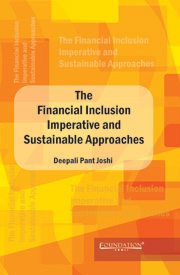Book contents
- Frontmatter
- Contents
- Foreword
- Acknowledgment
- 1 An Overview on Development
- 2 Financial Inclusion: The Nature and Extent of the Challenge
- 3 Financial Inclusion: The Indian Perspective
- 4 Tackling Financial Inclusion and RBI Policy: Responses and Voluntary Initiatives of Banks
- 5 Microfinance Experience and Other Institutional Approaches
- 6 Policy Response Committee on Financial Inclusion
- 7 International Experience in Promoting Financial Inclusion and Policy Responses
- 8 The Way Forward – Determinants and Macro Policies
- Appendix
- Bibliography
- Index
8 - The Way Forward – Determinants and Macro Policies
Published online by Cambridge University Press: 05 June 2012
- Frontmatter
- Contents
- Foreword
- Acknowledgment
- 1 An Overview on Development
- 2 Financial Inclusion: The Nature and Extent of the Challenge
- 3 Financial Inclusion: The Indian Perspective
- 4 Tackling Financial Inclusion and RBI Policy: Responses and Voluntary Initiatives of Banks
- 5 Microfinance Experience and Other Institutional Approaches
- 6 Policy Response Committee on Financial Inclusion
- 7 International Experience in Promoting Financial Inclusion and Policy Responses
- 8 The Way Forward – Determinants and Macro Policies
- Appendix
- Bibliography
- Index
Summary
The Future
With decades of rapid growth behind us, and very positive prospects ahead, India is enjoying an unprecedented position of influence in the global economy. The years ahead should be years of growth and opportunity that will enable us, as important members of the global community of nations to make further progress in the struggle against poverty and move towards the attainment of the Millennium Development Goals.
Policy for All Inclusive Growth
The challenge of extending India's growing prosperity to the poorest sections of society remains pressing and immediate. Without a significant increase in investment, the region will fall short of achieving several millennium development goals, particularly with regard to health, water supply, and sanitation, primary education and the environment. Financial inclusion starts with the vision that the poor are bankable and experience has shown that poor people can be enabled to have access to credit and other financial services, the services when effectively used by them will enhance their contribution to the economy. These can be delivered in a financially sustainable way. Much has been done and much remains to be done. What is important is that by recognising this we seize the opportunity to take on the many arduous challenges that remain and forge ahead. This is critical. We have concluded that growth, per se, is not enough.
Growth with Equity
We have to broaden the base of growth and through the processes of financial inclusion, we have to address the problems of poverty by redirecting our investments and development efforts towards the poor to promote equity with efficiency.
- Type
- Chapter
- Information
- The Financial Inclusion Imperative and Sustainable Approaches , pp. 216 - 254Publisher: Foundation BooksPrint publication year: 2011

